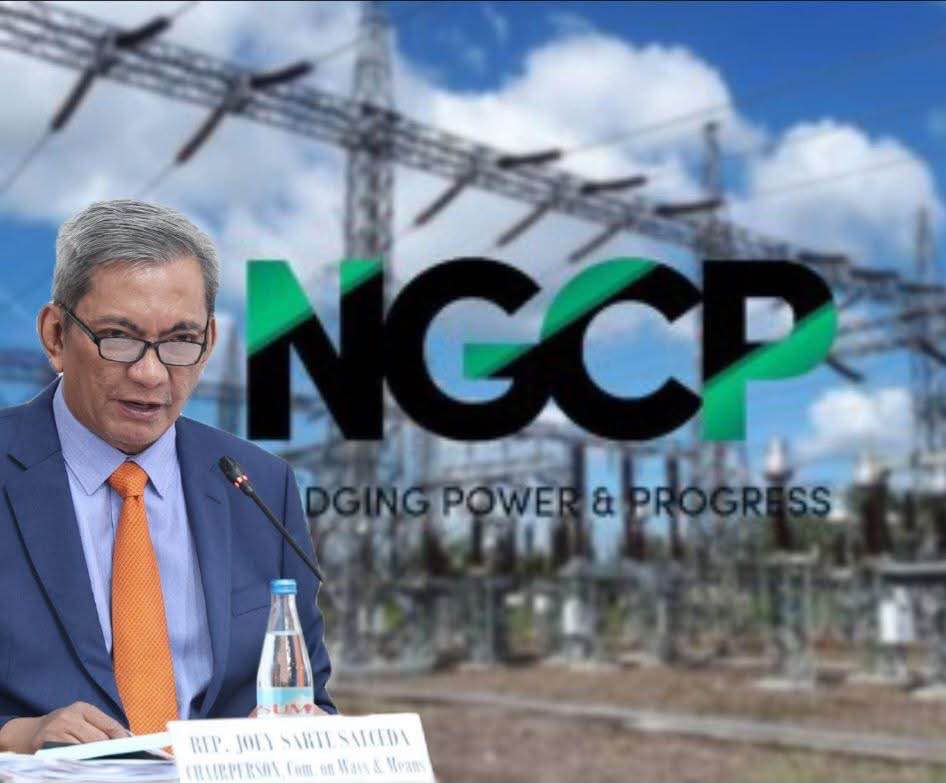THE House Committee on Ways and Means on Tuesday recommended a full-blown congressional inquiry to determine whether the National Grid Corporation of the Philippines (NGCP) is in violation of the country’s Anti-Dummy Law.
This recommendation follows concerns over the NGCP’s ownership structure, governance, and compliance with constitutional restrictions on foreign ownership of public utilities.
During a hearing by the committee, its chairperson, Albay 2nd District Rep. Joey Salceda, outlined his concerns regarding the NGCP’s governance and its apparent control by foreign entities.
NGCP, which manages and operates the Philippine power transmission grid, is required by law to maintain at least 60% Filipino ownership.
Based on regulatory disclosures, NGCP is 60% Filipino-owned through the Synergy Grid of the Philippines (SGP), while the remaining 40% of the company is controlled by the State Grid Corporation of China (SGCC)—a state-owned enterprise overseen by the Chinese Communist Party. However, SGP has two additional layers of subsidiaries for its indirect ownership over NGCP.
Salceda argued that NGCP’s ownership structure and operational practices suggest substantial foreign influence.
“While the NGCP has denied that it is controlled by the [SGCC], and that it has no executives that are Chinese nationals, its Chairman is Chinese, a top official of the SGCC, despite [SGP] supposedly being a larger shareholder than the [SGCC],” Salceda pointed out.
SGP holds 60 percent voting rights in NGCP, acquired through a share-swap deal that gave it 67 percent stakes each in OneTaipan Holdings Inc. and Pacifica2 Holdings.
OneTaipan owns Monte Oro Grid Resources Corp., which holds a 30 percent stake in NGCP, while Pacifica2 owns Calaca High Power Corp., which also holds 30 percent.
Salceda emphasized that NGCP’s ownership structure—split among SGCC, Monte Oro Grid Resources, and Calaca High Power—warrants scrutiny under the Supreme Court’s “grandfather rule.”
This rule examines the beneficial ownership and control of layered corporate structures to ensure compliance with constitutional restrictions.
“We must look into the citizenship of the individual stockholders, i.e., natural persons, of that investor corporation to determine if the constitutional and statutory restrictions are complied with,” Salceda pointed out.
“If the shares of stock of the immediate investor corporation is in turn held and controlled by another corporation, then we must look into the citizenship of the individual stockholders of the latter corporation,” he added.
Salceda noted that even when the 60-40 Filipino-to-foreign equity ratio appears to be met, the grandfather rule requires further scrutiny if there is doubt about the true ownership and control.
“A resort to the Grandfather Rule is necessary if doubt exists as to the locus of the beneficial ownership and control,” Salceda explained.
“In this case, a further investigation as to the nationality of the personalities with the beneficial ownership and control of the corporate shareholders in both the investing and investee corporations is necessary,” he added.
Salceda also highlighted the composition of the NGCP’s Board of Directors, which includes several Chinese nationals in key positions.
The NGCP Board includes Chairman Zhu Guangchao (Chinese); Vice Chairmen Robert Coyiuto Jr. (Filipino) and Henry Sy Jr. (Filipino); President/CEO Anthony Almeda (Filipino); and Directors Jose Pardo (Filipino), Francis Chua (Chinese), Shan Shewu (Chinese), Liu Ming (Chinese), Liu Xinhua (Chinese), and Paul Sagayo Jr. (Filipino).
Citing official Chinese government sources, Salceda noted claims that SGCC has secured the “right to run” the Philippine grid.
“The official website of China’s Belt and Road Initiative says the State Grid gained the ‘right to run’ the Philippine grid,” he emphasized.
He also referenced a report authored by SGCC officials, which stated that the Chinese entity was “deeply involved” in the governance of its overseas holdings, including key operational and senior management decisions.
The Anti-Dummy Law (Commonwealth Act No. 108, as amended) prohibits non-Filipino nationals from participating in the management, operation, administration, or control of an entity engaged in a nationalized or partially nationalized activity.
“For violations of the Anti-Dummy Law, the penalty of forfeiture of ‘such right, franchise, privilege, and the property or business enjoyed or acquired in violation of the provisions of this Act’ may be imposed,” Salceda said.
Earlier, lawmakers warned that foreign control over the NGCP might violate legal limits and threaten the country’s energy security.
They cautioned that foreign influence over such a critical public utility could have significant and far-reaching consequences.
If proven, they stressed, NGCP’s franchise must be forfeited, and control over this vital infrastructure returned to the Philippine government. (END)

